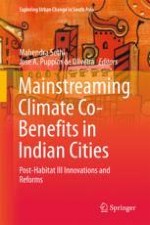2018 | OriginalPaper | Buchkapitel
8. Co-benefits of Waste to Energy
verfasst von : Amit Chatterjee, Manmohan Kapshe, Binayak Choudhury, Shomit Bade
Erschienen in: Mainstreaming Climate Co-Benefits in Indian Cities
Verlag: Springer Singapore
Aktivieren Sie unsere intelligente Suche, um passende Fachinhalte oder Patente zu finden.
Wählen Sie Textabschnitte aus um mit Künstlicher Intelligenz passenden Patente zu finden. powered by
Markieren Sie Textabschnitte, um KI-gestützt weitere passende Inhalte zu finden. powered by
